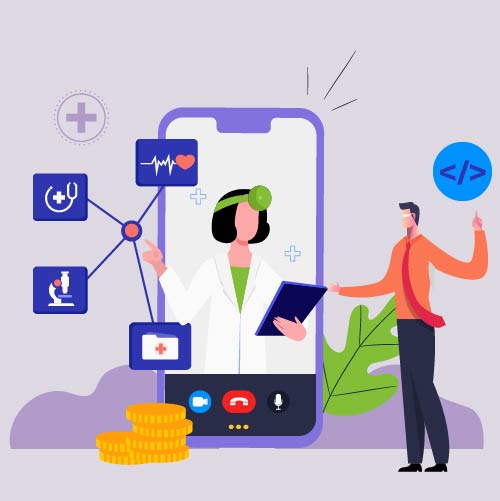The field of mobile health (mHealth) has witnessed remarkable growth in recent years, driven by advancements in technology, increasing smartphone penetration, and the rising demand for convenient healthcare solutions. As we look ahead, several key trends are poised to shape the future of mHealth app development, revolutionizing the way healthcare services are delivered, accessed, and managed. In this article, we'll explore these top trends and their implications for the evolving landscape of mHealth.
1. Telemedicine and Virtual Consultations
Telemedicine has emerged as a game-changer in healthcare delivery, allowing patients to consult healthcare providers remotely through video calls, chats, and other virtual platforms. mHealth apps are integrating telemedicine features to facilitate virtual consultations, diagnosis, prescriptions, and follow-ups, offering convenience, accessibility, and cost-effectiveness for patients and healthcare professionals alike. The future of mHealth app development lies in enhancing telemedicine capabilities with AI-driven diagnostics, real-time monitoring, and secure data transmission for improved patient outcomes.
2. Wearable Technology Integration
The integration of wearable devices with mHealth apps is another significant trend shaping the future of healthcare. Wearables such as smartwatches, fitness trackers, and biosensors can collect real-time health data, including heart rate, activity levels, sleep patterns, and more. mHealth apps leverage this data to provide personalized health insights, track progress, and encourage healthy behaviors. The future holds immense potential for wearable technology integration in mHealth, leading to proactive healthcare management and preventive interventions.
3. AI-Powered Healthcare Solutions
Artificial Intelligence (AI) is revolutionizing various aspects of healthcare, and mHealth is no exception. AI-powered mHealth apps can analyze vast amounts of patient data, identify patterns, predict health risks, and provide personalized treatment recommendations. From virtual health assistants and chatbots for symptom assessment to predictive analytics for disease management, AI-driven solutions enhance clinical decision-making, patient engagement, and overall healthcare efficiency.
4. Remote Patient Monitoring
Remote Patient Monitoring (RPM) is gaining traction as a key trend in mHealth app development, especially for managing chronic conditions and post-operative care. RPM solutions enable healthcare providers to remotely monitor patients' vital signs, medication adherence, and progress in real time, allowing for early intervention and proactive care management. mHealth apps with RPM capabilities empower patients to actively participate in their healthcare journey, leading to improved outcomes and reduced hospitalizations.
5. Blockchain for Data Security
Data security and privacy are paramount in healthcare, and blockchain technology is increasingly being adopted to address these concerns in mHealth app development. Blockchain ensures secure and tamper-proof storage of patient records, enables secure sharing of health data among stakeholders, and enhances transparency and trust in healthcare transactions. As data breaches and cyber threats continue to pose challenges, blockchain-based mHealth apps offer robust solutions for safeguarding sensitive health information.
6. Personalized Health and Wellness Programs
Personalization is a key driver of user engagement and satisfaction in mHealth apps. The future of mHealth app development revolves around delivering personalized health and wellness programs tailored to individual needs, preferences, and health goals. Whether it's personalized fitness plans, nutrition guidance, mental health support, or chronic disease management, mHealth apps leverage user data, AI algorithms, and behavioral insights to offer customized solutions that drive positive health outcomes.
7. Gamification and Behavioral Change
Gamification techniques are being increasingly integrated into mHealth apps to promote positive behavior change, encourage adherence to treatment plans, and foster patient engagement. Gamified elements such as rewards, challenges, progress tracking, and social interactions make health management fun, interactive, and motivating for users. By gamifying mHealth experiences, app developers can enhance user retention, compliance, and long-term health behavior improvements.
8. Integration with EHR Systems
Seamless integration with Electronic Health Record (EHR) systems is essential for mHealth apps to access comprehensive patient data, facilitate continuity of care, and ensure interoperability with healthcare providers' workflows. The future of mHealth app development involves robust APIs, interoperable standards, and secure data exchange protocols to enable efficient data sharing, care coordination, and clinical decision support across healthcare settings.
9. Focus on Mental Health and Wellbeing
With growing awareness and prioritization of mental health, mHealth app development is witnessing a shift towards addressing mental wellness needs. mHealth apps for mental health offer features such as mood tracking, stress management techniques, mindfulness exercises, cognitive behavioral therapy (CBT) tools, and access to licensed therapists or counselors. The integration of mental health services into mHealth platforms reflects a holistic approach to healthcare that encompasses both physical and mental wellbeing.
10. Regulatory Compliance and Data Ethics
As mHealth apps evolve and expand their capabilities, regulatory compliance and data ethics become paramount considerations. App developers must adhere to stringent regulatory standards such as HIPAA (Health Insurance Portability and Accountability Act) for data protection, patient privacy, and legal compliance. Moreover, ethical considerations regarding data ownership, consent, transparency, and responsible use of AI algorithms are essential in building trust and credibility among users and stakeholders.
In conclusion, the future of mHealth app development is marked by innovation, collaboration, and a user-centric approach that prioritizes personalized care, data security, and positive health outcomes. By embracing these top trends and leveraging advanced technologies, mHealth app developers are poised to revolutionize healthcare delivery, empower patients, and drive meaningful impact in the global healthcare ecosystem.


No comments yet